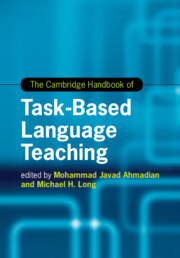Book contents
- The Cambridge Handbook of Task-Based Language Teaching
- Cambridge Handbooks In Language And Linguistics
- The Cambridge Handbook of Task-Based Language Teaching
- Copyright page
- Dedication
- Contents
- Figures
- Tables
- Contributors
- Preface The Origins and Growth of Task-Based Language Teaching
- Part I The Rationale for Task-Based Language Teaching
- Part II Tasks and Needs Analysis
- Part III The Task Syllabus and Materials
- Part IV Methodology and Pedagogy
- 9 A Psycholinguistically Motivated Methodology for Task-Based Language Teaching
- 10 Technology-Mediated Task-Based Language Teaching
- 10A Delivering Task-Based Language Teaching at Scale
- 10B Task-Based Language Teaching and Indigenous Language Revitalisation
- 10C Task-Based Simulations for Diplomatic Security Agents
- Part V Task-Based Language Teaching with School-Age Children
- Part VI The Teacher in Task-Based Language Teaching
- Part VII Task-Based Assessment and Program Evaluation
- Part VIII Research Needs and Future Prospects
- Index
- References
10C - Task-Based Simulations for Diplomatic Security Agents
from Part IV - Methodology and Pedagogy
Published online by Cambridge University Press: 19 November 2021
- The Cambridge Handbook of Task-Based Language Teaching
- Cambridge Handbooks In Language And Linguistics
- The Cambridge Handbook of Task-Based Language Teaching
- Copyright page
- Dedication
- Contents
- Figures
- Tables
- Contributors
- Preface The Origins and Growth of Task-Based Language Teaching
- Part I The Rationale for Task-Based Language Teaching
- Part II Tasks and Needs Analysis
- Part III The Task Syllabus and Materials
- Part IV Methodology and Pedagogy
- 9 A Psycholinguistically Motivated Methodology for Task-Based Language Teaching
- 10 Technology-Mediated Task-Based Language Teaching
- 10A Delivering Task-Based Language Teaching at Scale
- 10B Task-Based Language Teaching and Indigenous Language Revitalisation
- 10C Task-Based Simulations for Diplomatic Security Agents
- Part V Task-Based Language Teaching with School-Age Children
- Part VI The Teacher in Task-Based Language Teaching
- Part VII Task-Based Assessment and Program Evaluation
- Part VIII Research Needs and Future Prospects
- Index
- References
Summary
United States Department of State Foreign Service officers are usually required to learn a language spoken in the country of their onward diplomatic position. Their primary objective is functional ability to do their jobs using the target language. The Foreign Service Institute (FSI) trains (a) diplomats (e.g., consular affairs, public diplomacy, management, and political or economic officers) and (b) specialists (e.g., diplomatic security, information technology, financial management, and general services) in more than sixty languages. We derived this case study from FSI’s Spanish tradecraft curriculum developed with and for specialist officers, who are Diplomatic Security (DS) agents. About half of all FSI Spanish students are returning students, already experienced at their jobs, needing to learn Spanish for their next onward post. The other half typically are entry-level officers and first-time language learners, who preferably attend FSI’s introductory tradecraft training in English before enrolling in Spanish.
- Type
- Chapter
- Information
- The Cambridge Handbook of Task-Based Language Teaching , pp. 374 - 390Publisher: Cambridge University PressPrint publication year: 2021

